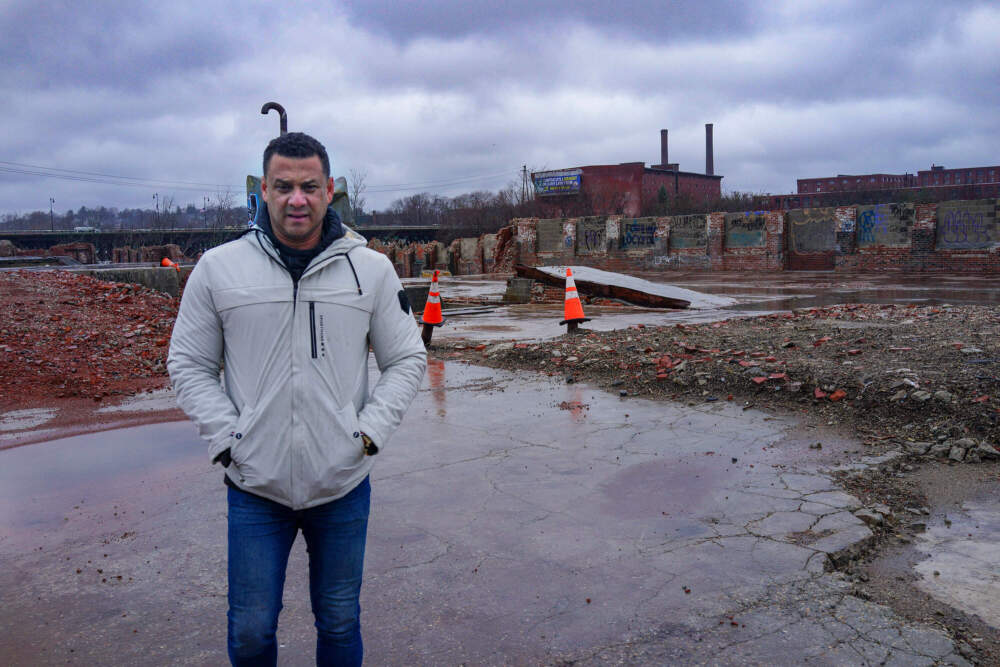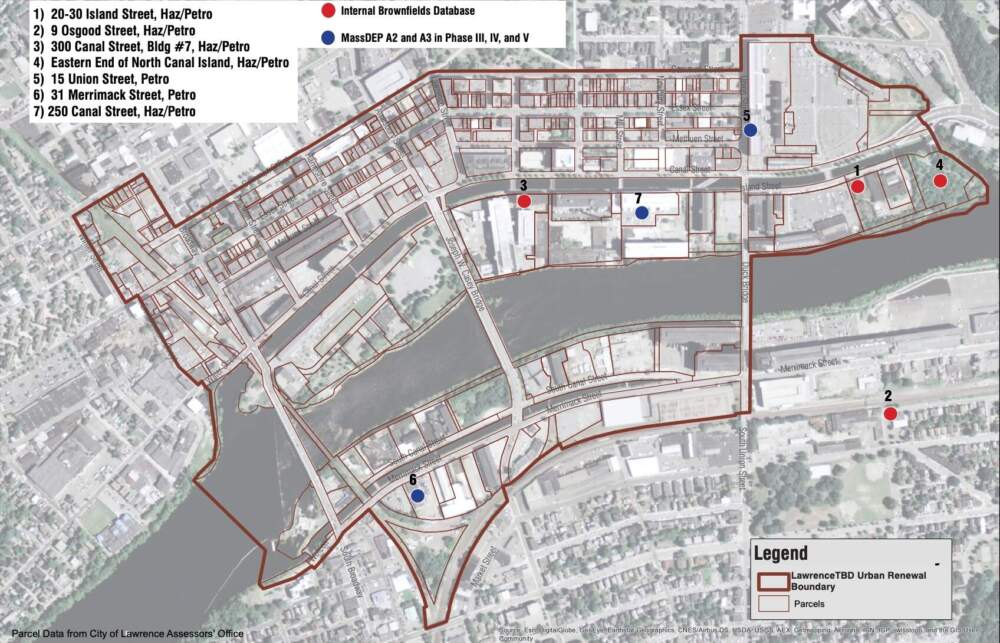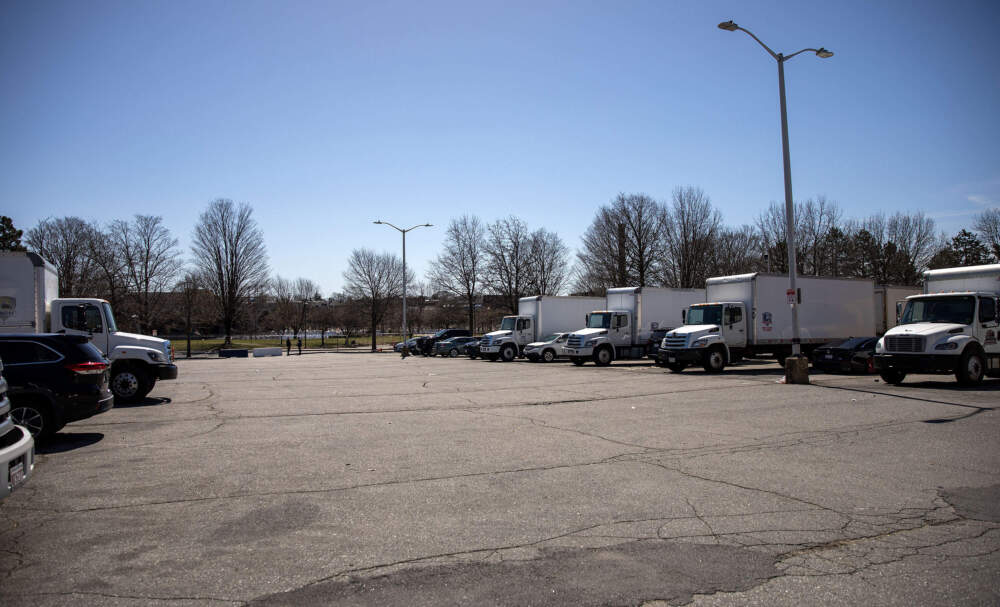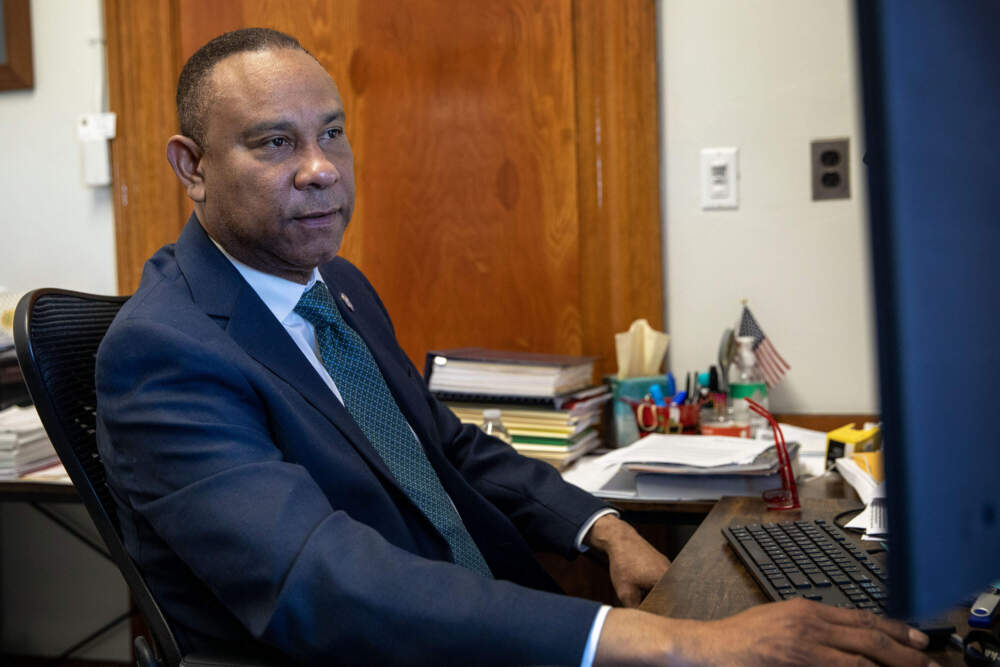Advertisement
Urban renewal battle in Lawrence pits mayor against city council
ResumeOn the banks of the Merrimack River in Lawrence, a bygone paper mill is now marked by graffiti and piles of bricks, and until recently, it was host to a homeless encampment. But city officials say that the area, just blocks from downtown, has the kind of development potential old cities seldom see.
"This is a waterfront property right at the Merrimack River," said Lawrence City Council President Jeovanny Rodriguez, surveying the 4-acre parcel. "A property like this coming up, available for development — a lot of people have a lot of interest."

The old mill site is among 11 blighted or underused city properties that could transform downtown Lawrence and bring tens of millions of investment dollars to one of the poorest cities in Massachusetts. The city singled out the land in a 2017 urban renewal plan. But now that it’s time to execute, Lawrence Mayor Brian DePeña is battling the city council over who’s in charge.
The fight centers on who gets to approve the future use of the 11 sites. The DePeña administration argues it was empowered by the urban renewal plan to move forward, reaching deals with private developers — without further council approval. However, Rodriguez is adamant that's not the case, and he's leading councilors who say they should vote on how each property is used.
"The only thing that I can tell you is this is not transparent," Rodriguez said of the mayor's actions.
In October, the mayor asked the council to approve the bulk transfer of the 11 properties to the Lawrence Redevelopment Authority. Councilors refused, so the mayor's next step was to issue an executive order authorizing the transfer.
"The mayor said, 'No, we're wasting our time,'" said Octavien Spanner, a senior adviser to DePeña and his go-to person on redevelopment efforts. "We need to really implement and execute what the city council ... has already approved."
The council disagrees. The members voted 4-3 in April to hire a lawyer to stop the mayor's land transfer. The council will hold a special meeting on the matter next week.

Housing or green space?
The properties in play reflect a number of longtime aspirations — sometimes conflicting — for revitalizing Lawrence. For instance, across the river from the paper mill site is Pemberton Park, a river walk with a decaying parking lot alongside it, filled with box trucks and oil stains. The urban renewal plan calls for creating a sprawling green space here, with a concert venue inspired by Boston’s Esplanade. But city councilors say the mayor now wants to build housing there instead.

"The plan is very clear [for] that park," said Maggie Church, a housing expert who served as project manager for the urban renewal plan, speaking to the council at the April public meeting. Church said she had "serious concerns" about a centerpiece of the plan potentially being abandoned.
"The desire of the public and the community ... is for a concert venue and expanded public park, not for residential development on that site," Church said.
The mayor’s office said conditions changed since the plan passed seven years ago; Lawrence is now facing a severe housing shortage, and the city needs tax revenue that a park won’t generate.
"They said, 'let's make it green space,'" Spanner, the mayor's adviser, said. But, he added, "We need to reevaluate, see if that is consistent with the needs of the community now."
Spanner said some changes to the urban renewal plan await state approval. But the mayor is moving forward to transfer the deeds from the city to the Lawrence Redevelopment Authority — the quasi-city agency handling urban renewal.
Urban renewal under the microscope
Lawrence isn't alone in its battles over money, power and development. In Boston, the mayor is all but dissolving the redevelopment agency and creating a new city planning department. And some towns are rebelling against a state law that requires more zoning for possible affordable housing in areas served by rail.
The urban renewal framework dates back to the mid-20th century, when the federal government gave cities special powers to reverse urban decay. Through redevelopment authorities, cities could streamline the revitalization of blighted properties, exempting officials from certain requirements involved in using publicly owned land. And redevelopment authority boards work at the behest of mayors. In Massachusetts, state law requires that four out of five board members be appointed by mayors.
While Boston distances itself from old-school urban renewal, Lawrence is doubling down on those powers. The mayor dispatched his senior advisor, Spanner, to lead the authority, a move the council president objected to in a public grilling, but the city defends and development specialists say is not unusual.
Sitting at his desk in City Hall, surrounded by planning documents, Spanner said DePeña is taking action because urban renewal has been a top priority for the mayor since his term began at the end of 2021.

Conflicting legal advice in the city
As Lawrence's development clash has spilled into public view, two lawyers employed by the city have presented opposing interpretations of who has authority over the land. Both made their cases at a recent council meeting.
City attorney Timothy Houten opposed the mayor’s move to bypass the council: "I believe that [for] each individual lot, there should be an approval by the city council," he said.
Siding with the mayor was Brian Corrigan, a lawyer for the Lawrence Redevelopment Authority. Corrigan argued that in passing the urban renewal plan years ago, the council effectively gave the mayor control of the properties in question.
"What we intend to do is essentially what any other active redevelopment authority in the commonwealth does," Corrigan said.
He also suggested councilors are too busy to deliberate over the future of each lot: "What you guys have here is a massive agenda every two weeks — hundreds of items on your agenda," Corrigan said. "And I don't think this is the appropriate forum or venue for assessing redevelopment projects."
It was at that same council meeting that a majority of councilors voted to take legal action against the mayor. Dissenting was Councilor Marc Laplante, who served as the body's president prior to Rodriguez. Laplante said litigation should be a last resort.
"The very first thing we should be doing is engaging in a conversation, with the executive branch and perhaps even with the Lawrence Redevelopment Authority," Laplante said, "and see if there's an agreement."
Rodriguez later told WBUR he feels it's already clear that conversation would go nowhere. Meanwhile, officials from the mayor's office charge that councilors are playing politics with the future of Lawrence.
Given the entrenched, conflicting viewpoints over how to go forward, it may be a judge who decides whether the city council will have a say in the next steps of Lawrence's urban renewal process.
This segment aired on April 16, 2024.
